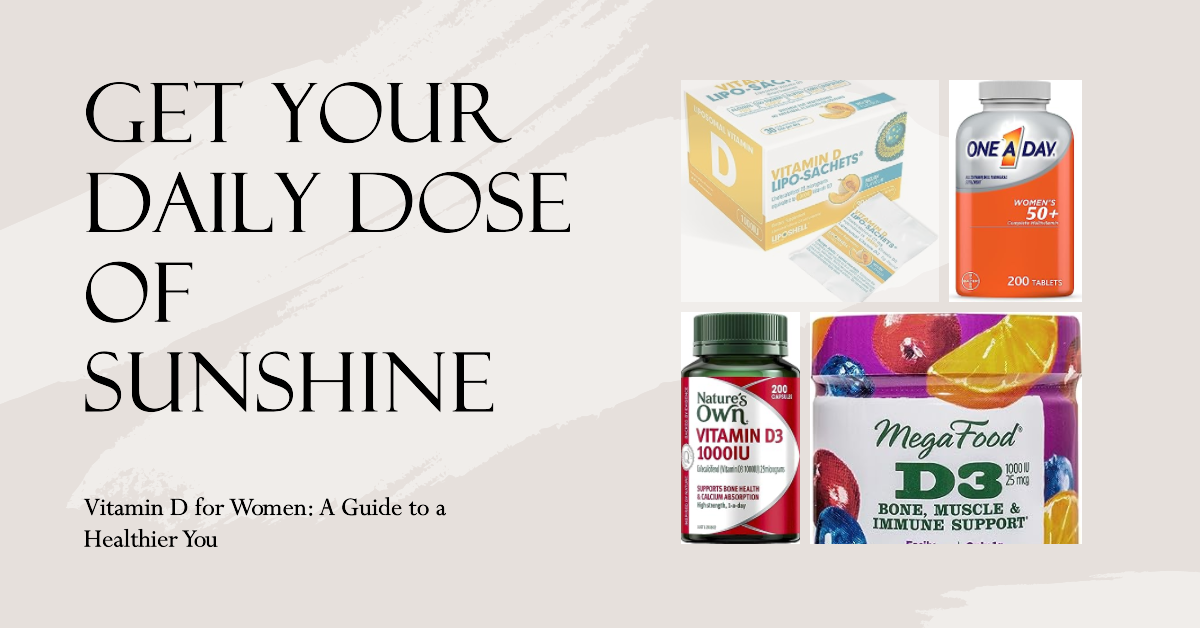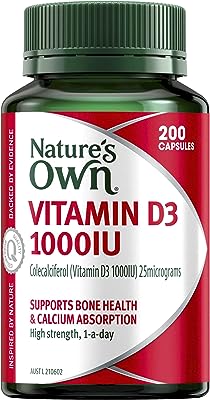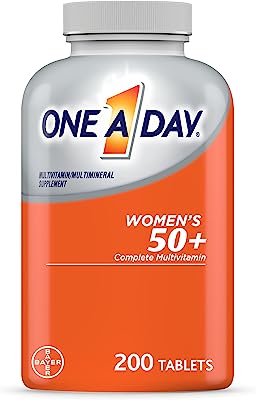Introduction
Are you looking for a natural way to improve your health and well-being? Look no further than vitamin D. This essential vitamin, known as the “sunshine vitamin,” is not only important for overall health, but it also plays a crucial role in women’s health. From boosting your mood to strengthening your bones, vitamin D offers numerous benefits that every woman should be aware of. So sit back, relax, and let’s uncover the sunshine for your health.
Key Takeaways
- Vitamin D plays a pivotal role in ensuring bone health for women, aiding in the absorption of calcium and phosphate.
- When exposed to UVB rays from sunlight, the skin produces Vitamin D3, providing a natural source of the nutrient.
- Women, especially post-menopausal ones, are at heightened risk for osteoporosis due to Vitamin D deficiency.
- For those with limited sun exposure, fatty fish, fortified dairy products, eggs, and beef liver are rich dietary sources of Vitamin D.
- Regular monitoring through blood tests, sun exposure, consuming Vitamin D rich foods, and considering supplements are ways to ensure adequate Vitamin D levels.
1. Importance of Vitamin D for Women

Photo: Amazon
1.1 Why Vitamin D is Essential for Women?
Vitamin D is an essential nutrient that plays a crucial role in women’s health. It is essential for maintaining strong bones, aiding in the absorption of calcium, and supporting a healthy immune system. Vitamin D also has a significant impact on mood and mental health, making it a vital nutrient for overall well-being.
1.2 Benefits of Vitamin D for Women’s Health
The benefits of vitamin D for women’s health are numerous. Adequate levels of vitamin D can help prevent osteoporosis and reduce the risk of fractures. It also plays a crucial role in supporting a healthy immune system, which is especially important for women who are pregnant or breastfeeding. Additionally, vitamin D has been linked to improved mood and mental health, as it helps regulate serotonin levels in the brain.
1.3 Role of Vitamin D in Calcium Absorption
One of the key roles of vitamin D is its ability to enhance the absorption of calcium in the body. Calcium is essential for maintaining strong bones and teeth, and vitamin D helps ensure that calcium is effectively absorbed from the diet. Without sufficient vitamin D, the body may struggle to absorb enough calcium, leading to a higher risk of developing osteoporosis and fractures.
1.4 Vitamin D and Bone Health
Maintaining strong and healthy bones is crucial for women of all ages, and vitamin D plays a significant role in achieving this. Vitamin D helps regulate the levels of calcium and phosphorus in the body, which are essential minerals for bone health. By promoting calcium absorption and bone mineralization, vitamin D helps prevent bone loss and reduces the risk of osteoporosis.
Any Questions🤔?
Reach out to us! We’re here to clarify and prioritize your well-being. 🌟
1.5 Impact of Vitamin D on Mood and Mental Health
Vitamin D has been linked to improved mood and mental health in women. Research suggests that low levels of vitamin D may be associated with an increased risk of depression and other mood disorders. Vitamin D plays a role in regulating serotonin levels in the brain, which is a neurotransmitter that contributes to feelings of happiness and well-being. Adequate levels of vitamin D can help support a healthy mood and overall mental well-being.
2. Sources of Vitamin D
2.1 Sunlight: The Primary Source of Vitamin D
The primary source of vitamin D is sunlight. When your skin is exposed to sunlight, it produces vitamin D through a process triggered by UVB rays. Spending just 15-20 minutes in the sun, a few times a week, can provide sufficient vitamin D for most people. However, it’s important to balance sun exposure with precautions to protect your skin from harmful UV radiation.
2.2 Dietary Sources of Vitamin D
While sunlight is the primary source of vitamin D, it can also be obtained through certain foods. Fatty fish, such as salmon and mackerel, are excellent sources of vitamin D. Other dietary sources include fortified dairy products, fortified plant-based milk alternatives, and eggs. Including these foods in your diet can help ensure an adequate intake of vitamin D.
2.3 Vitamin D Supplements
In cases where obtaining sufficient vitamin D from sunlight and diet is challenging, vitamin D supplements can be an effective option. These supplements come in various forms, such as tablets, capsules, or liquid drops. It’s important to consult with your healthcare provider to determine the appropriate dosage for your specific needs.
3. Factors Affecting Vitamin D Production
3.1 Geographic Location
Geographic location plays a significant role in vitamin D production. Those living in regions farther from the equator, where sunlight intensity is lower, may have reduced opportunities for natural vitamin D synthesis. In these areas, it becomes even more crucial to ensure adequate vitamin D intake through sunlight, diet, or supplements.
3.2 Season and Sun Exposure
The season and duration of sun exposure also impact vitamin D production. In regions with distinct seasons, the angle of the sun changes throughout the year, affecting the UVB radiation levels necessary for adequate vitamin D synthesis. Additionally, spending more time outdoors during the summer months provides increased opportunities for vitamin D production compared to the winter season.
3.3 Skin Tone
Skin tone affects the body’s ability to produce vitamin D. Individuals with darker skin have more melanin, which can act as a natural sunscreen and reduce the skin’s ability to produce vitamin D in response to sunlight. Consequently, those with darker skin may require more sun exposure or higher vitamin D supplementation to maintain adequate levels.
3.4 Age and Vitamin D Production
Age can affect the body’s ability to produce vitamin D. As we age, the skin becomes less efficient at converting sunlight into vitamin D. Older adults may have reduced sun exposure or impaired absorption of vitamin D from the diet, making them more prone to vitamin D deficiency. Regular monitoring of vitamin D levels and adjustments to sun exposure or supplementation are essential for older women.
3.5 Sunscreen and Vitamin D
While it is crucial to protect your skin from harmful UV radiation, regular sunscreen use may affect vitamin D production. Sunscreen with a high sun protection factor (SPF) can reduce the skin’s ability to produce vitamin D. However, it’s important to balance the need for sun protection with the need for vitamin D production. Applying sunscreen after a few minutes of sun exposure or choosing outdoor activities outside peak UV hours can help strike a balance.
4. Vitamin D Deficiency in Women
4.1 Prevalence and Risk Factors of Vitamin D Deficiency
Vitamin D deficiency is a significant health concern, especially among women. Several factors contribute to the prevalence of vitamin D deficiency, including limited sun exposure, dietary deficiencies, obesity, darker skin tone, and certain medical conditions. Women who cover their skin for cultural or religious reasons may also be at a higher risk of vitamin D deficiency.
4.2 Symptoms and Health Issues Associated with Vitamin D Deficiency
Vitamin D deficiency can cause various symptoms and health issues. Common symptoms include fatigue, muscle weakness, bone and joint pain, and an increased susceptibility to infections. Prolonged vitamin D deficiency can lead to osteoporosis, increased risk of fractures, reduced immune function, mood disorders, and impaired reproductive health. It is important to address vitamin D deficiency promptly to prevent long-term complications.
4.3 Screening and Diagnosis of Vitamin D Deficiency
Screening for vitamin D deficiency involves a blood test that measures the concentration of vitamin D in your blood. A serum 25-hydroxyvitamin D test is the most reliable method for assessing vitamin D status. Based on the results, your healthcare provider can determine if vitamin D supplementation is necessary or if lifestyle and dietary modifications will suffice.
5. Recommended Daily Intake of Vitamin D for Women
5.1 General Recommendations
The recommended daily intake of vitamin D varies based on age and health conditions. For most women, the general daily intake recommendation is 600-800 IU (International Units) per day. However, certain groups, such as pregnant or lactating women, may require higher doses, as advised by their healthcare provider. It is essential to consult with a healthcare professional to determine the appropriate daily intake for your specific needs.
Any Questions🤔?
Reach out to us! We’re here to clarify and prioritize your well-being. 🌟
5.2 Age-specific Recommendations
The daily intake recommendations for vitamin D may vary based on age. While younger women may require lower doses, older adults, especially those over the age of 70, may need higher doses. The specific recommendations for various age groups can be discussed with your healthcare provider to ensure optimal vitamin D intake.
6. Vitamin D and Women’s Reproductive Health
6.1 Vitamin D and Female Fertility
Vitamin D has been linked to female fertility and reproductive health. Research suggests that vitamin D deficiency may be associated with certain reproductive disorders, including polycystic ovary syndrome (PCOS) and menstrual irregularities. Adequate vitamin D levels may help regulate hormones and improve overall reproductive health. However, further studies are needed to establish concrete conclusions.
6.2 Vitamin D in Pregnancy
During pregnancy, vitamin D plays a crucial role in supporting both the mother and baby’s health. Sufficient vitamin D levels are essential for proper fetal development, including skeletal growth and immune system function. Vitamin D deficiency during pregnancy has been linked to an increased risk of gestational diabetes, preeclampsia, preterm birth, and low birth weight. Pregnant women should consult with their healthcare provider to ensure optimal vitamin D levels.
6.3 Vitamin D and Menopause
Vitamin D may play a role in managing symptoms associated with menopause. Some studies suggest that women with higher vitamin D levels may experience reduced menopausal symptoms, such as hot flashes and mood changes. While more research is needed to understand the mechanisms behind this relationship, maintaining adequate vitamin D levels in menopausal women is important for overall health and well-being.

7. Vitamin D and Women’s Cancer Risk
7.1 Vitamin D and Breast Cancer
There is growing evidence suggesting a link between vitamin D and breast cancer risk. Some studies indicate that higher vitamin D levels may be associated with a reduced risk of developing breast cancer. Nonetheless, more research is needed to fully understand this relationship and establish definitive recommendations. It is crucial for women to maintain appropriate vitamin D levels through sunlight, diet, or supplementation while following routine breast cancer screening guidelines.
7.2 Vitamin D and Ovarian Cancer
The association between vitamin D and ovarian cancer is an area of ongoing research. While some studies suggest a potential link between vitamin D and a decreased risk of ovarian cancer, more research is needed to determine the underlying mechanisms and develop evidence-based recommendations. Women should prioritize overall wellness through a healthy lifestyle, including adequate vitamin D intake, while staying informed about ovarian cancer risk factors.
7.3 Vitamin D and Cervical Cancer
Research exploring the relationship between vitamin D and cervical cancer is still in its early stages. Preliminary studies have suggested that vitamin D may have a protective effect against cervical cancer, but more research is needed to validate these findings. Regular cervical cancer screenings, such as Pap smears, remain the primary means of early detection and prevention of cervical cancer.
8. Vitamin D and Autoimmune Diseases in Women
8.1 Multiple Sclerosis
Multiple sclerosis (MS) is an autoimmune disease that affects the central nervous system. There is emerging evidence suggesting a potential link between vitamin D and the risk of developing MS. Some studies indicate that higher vitamin D levels may be associated with a reduced risk of developing MS. However, further research is required to fully understand this association and its potential implications.
8.2 Rheumatoid Arthritis
Rheumatoid arthritis (RA) is another autoimmune disease that primarily affects the joints. Studies have shown that vitamin D may have anti-inflammatory effects that could potentially benefit individuals with RA. While the evidence is promising, more research is needed to determine the exact relationship between vitamin D and RA and how it can be incorporated into the management of the disease.
8.3 Systemic Lupus Erythematosus
Systemic Lupus Erythematosus (SLE), commonly known as lupus, is a chronic autoimmune disease that can affect multiple organs and systems in the body. Vitamin D deficiency has been frequently observed in individuals with lupus. While further research is needed, some studies suggest that maintaining adequate vitamin D levels may help manage lupus symptoms, reduce disease activity, and improve overall quality of life.

9. Vitamin D and Heart Health in Women
9.1 Role of Vitamin D in Cardiovascular Health
Vitamin D plays a role in maintaining cardiovascular health. Research suggests that sufficient vitamin D levels may help reduce the risk of cardiovascular diseases, including hypertension, heart disease, and stroke. Vitamin D helps regulate blood pressure, reduce inflammation, and improve endothelial function, all of which contribute to cardiovascular health.
9.2 Vitamin D and Hypertension
Hypertension, or high blood pressure, is a prevalent health condition that can significantly impact heart health. Some studies have indicated that individuals with higher vitamin D levels may have a reduced risk of developing hypertension. However, additional research is necessary to determine the exact mechanisms and optimal vitamin D levels needed to prevent and manage hypertension effectively.
9.3 Vitamin D and Heart Disease Risk
Vitamin D deficiency has been associated with an increased risk of heart disease. Adequate vitamin D levels may help reduce inflammation, improve cholesterol profiles, and support overall cardiovascular health. While more research is needed, women should strive for optimal vitamin D levels and adopt a heart-healthy lifestyle to reduce the risk of heart disease.
10. Vitamin D Safety and Considerations for Women
10.1 Vitamin D Toxicity and Side Effects
While vitamin D is essential for good health, excessive intake can lead to toxicity. Vitamin D toxicity is rare and usually occurs when extremely high doses are consumed for an extended period. Symptoms of toxicity include nausea, vomiting, loss of appetite, excessive thirst, and calcium buildup in the blood and urine. It is essential to follow recommended dosage guidelines and consult with a healthcare professional if you have any concerns.
10.2 Vitamin D Interactions and Recommendations
Certain medications and medical conditions may interact with vitamin D supplements. It is important to inform your healthcare provider about all the medications and health conditions you have to ensure safe and optimal vitamin D supplementation. Your healthcare provider can provide personalized recommendations based on your individual needs, ensuring you receive the benefits of vitamin D while minimizing potential risks.

Photo: Amazon
FAQ (Frequently Asked Questions)
What is the significance of Vitamin D for women?
Answer: Vitamin D plays a pivotal role in ensuring bone health for women, especially in the absorption of calcium and phosphate. Additionally, it aids in cellular processes, immunity, mood regulation, and potentially in preventing certain diseases.
How does sunlight contribute to Vitamin D synthesis?
Answer: Sunlight is a primary source of Vitamin D for humans. When the skin is exposed to UVB rays, it produces Vitamin D3. Regular exposure to sunlight can ensure a sufficient daily dose of Vitamin D.
Can Vitamin D deficiency affect women differently than men?
Answer: Yes, women, especially post-menopausal ones, are at a higher risk for osteoporosis due to Vitamin D deficiency. Additionally, the deficiency might affect pregnancy and lactation adversely.
What are the primary food sources of Vitamin D for women who lack adequate sunlight exposure?
Answer: For those who can’t get enough Vitamin D from sunlight, foods like fatty fish, fortified dairy products, eggs, and beef liver can be beneficial sources.
How can one ensure they are getting an adequate amount of Vitamin D?
Answer: Regularly monitoring Vitamin D levels through blood tests, spending time in the sun, consuming Vitamin D rich foods, and taking supplements if needed can ensure an adequate Vitamin D intake.
Conclusion
Vitamin D is often referred to as the ‘sunshine vitamin’ due to its production in our skin upon sunlight exposure. For women, this vitamin is of paramount importance.
Not only does it ensure bone health, but it also plays a role in cellular processes, mood regulation, and even the prevention of certain diseases. While sunshine is a primary source, certain foods can also provide the necessary doses of this essential vitamin.
Disclaimer
Please keep in mind that nothing said here should be construed as a substitute for professional medical or financial advice from a qualified financial advisor or a licensed healthcare provider. If you use pharmaceuticals or have concerns after reading the above review information, be sure to speak with a qualified physician or financial expert before making any purchasing decisions. Since the claims made about these products have not been reviewed by the Food and Drug Administration or Health Canada, individual outcomes may differ and cannot be guaranteed. Research that has been approved by the FDA or Health Canada has not attested to the efficacy of these products. These goods do not offer any form of get-rich-quick scheme and are not designed to diagnose, treat, cure, or prevent any ailment. The reviewer disclaims all liability for incorrect pricing. For exact prices, view the product sales page







